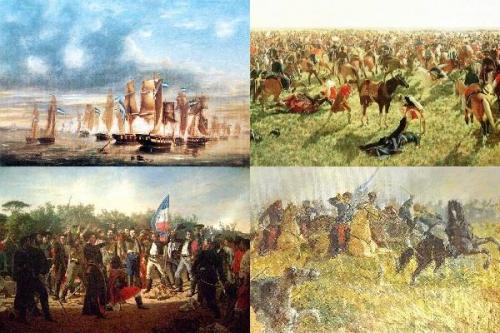Cannon fodder: wars between Latin American countries
The most remote roots of the wars between Latin American countries are to be found in the commercial and productive monopolies with which the Spanish Crown administered the economic life of Spanish America.
- Opinión

It is a basic axiom of international politics that countries that trade with each other and have complementary economies do not wage war; because they have more to lose than to gain: because wars are very expensive and are only won by arms manufacturers.
The most remote roots of the wars between Latin American countries are to be found in the commercial and productive monopolies with which the Spanish Crown administered the economic life of Spanish America. This prevented the creation of an economic community that shared natural resources, participated in a common manufacturing and commercial activity or developed an economic complementation that would create a Latin American economic system recognizing common purposes and interests.
The concession of monopolies as an administrative instrument for the development of economic life in Iberoamerica formed a disruptive and disorderly economic model that lasted unchanged from the 16th century to the 18th century. The secret collaboration between local businessmen and foreign economic interests was born, the first proof of which is the shameless British interference in the Spanish-American Independence wars. Following the independence of Hispanic America, in practice, most of the Latin American wars related to the Eastern side of the Rio de la Plata Estuary were linked to the English interest in controlling the exit of the riches towards the rest of the world – silver above all – that came from the heart of South America and which, since the creation of the Viceroyalty of the Rio de la Plata, which put Potosi under the jurisdiction of Buenos Aires, left through that port. In those wars Portugal and Brazil were the indispensable local vassal ally; the House of Braganza and Portugal depended on England to remain independent from Spain.
Then came Latin American wars related to ill-defined borders from the epoch of the Inca empire, mostly those related to the economic imperative of the access of the Andean states to the Amazon River, which is the central artery of the South American vital space.
The next cause of war was for raw materials destined to be processed in other parts of the globe in countries with greater industrial development that provided employment and welfare to workers who did not speak Spanish. That era encompasses the wars of the late nineteenth century and the entire twentieth century.
The title of this article is the same as that of a book that I have just completed and that will come out maybe in November.
Almeria, 03/06/2021
Del mismo autor
- Bubbles, Dumping and Refugees 06/09/2021
- Burbujas, dumping y refugiados 06/09/2021
- Afghanistan for China 25/08/2021
- Afganistán para China 25/08/2021
- 1819 ideas for the XXI Century economy 05/08/2021
- The keys to Chinese successful economic growth 22/07/2021
- Las claves del crecimiento económico exitoso de China 22/07/2021
- Need for a New International Value benchmark 05/07/2021
- Nueva Referencia Internacional de Valor 30/06/2021
- Taiwan in the near future 17/06/2021
Clasificado en
Guerra y Paz
- Prabir Purkayastha 08/04/2022
- Prabir Purkayastha 08/04/2022
- Adolfo Pérez Esquivel 06/04/2022
- Adolfo Pérez Esquivel 05/04/2022
- Vijay Prashad 04/04/2022
